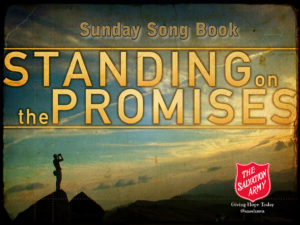In the Army of Jesus we’ve taken our stand
To fight ‘gainst the forces of sin;
To the rescue we go,
Satan’s power to o’erthrow,
And his captives to Jesus we’ll win.
I’ll stand for Christ, for Christ alone
Amid the tempest and the storm;
Where Jesus leads I’ll follow on;
I’ll stand, I’ll stand for Christ alone.
We go forth not to fight
‘Gainst the sinner, but sin;
The lost and the outcast we love;
And the claims of our King
We before them will bring,
As we urge them His mercy to prove.
Jesus pitied our case,
And He died for our race;
To save a lost world He was slain;
But He rose and now lives,
And His pardon He gives
Unto all who will call on His name.
Though our trials be great
And God’s enemies strong,
To battle undaunted we go,
For our warfare’s the Lord’s
And to Him we belong;
In His strength we shall conquer the foe.
Although this was written for soldiers of the Salvation Army, it is for all Christians who choose to stand up for Christ in the ongoing battle against sin and injustice in our world. The author, Fred Fry, was a very early-day Salvationist, accustomed to being harassed for his open profession of faith in Jesus. Fred was born in England in 1859, and was the son of Charles Fry, who led a Methodist choir and orchestra in Salisbury. Those were the days when Salvationists were often pelted with tomatoes, eggs and other items as they sang and preached the Gospel in the streets. Charles and his three sons offered to be bodyguards, and brought their brass instruments along as an afterthought, thus becoming the first Salvation Army Band!
Fred Fry worked with his father in the building trade, until Charles died in 1882. Fred must have made a strong impression on the Army’s leaders, as he was then appointed Secretary to Herbert Booth, son of Founder William Booth. For several years Fred held various musical positions within the Salvation Army, and for a time he was William Booth’s private secretary. In 1891 he was appointed Bandmaster of the International Staff Band, and the following year went to Canada as private secretary to then Commandant Herbert Booth. On Fred’s return to England, he worked for many years in the Town Clerk’s Department in Gillingham, and later became a Methodist preacher.
WORDS AND MUSIC: FRED FRY (ALT.)
S.A. SONG BOOK, 1987 EDITION, #687; 2015 EDITION, #960
REFERENCES: USAWEST.ORG
COLLIER, RICHARD, THE GENERAL NEXT TO GOD







